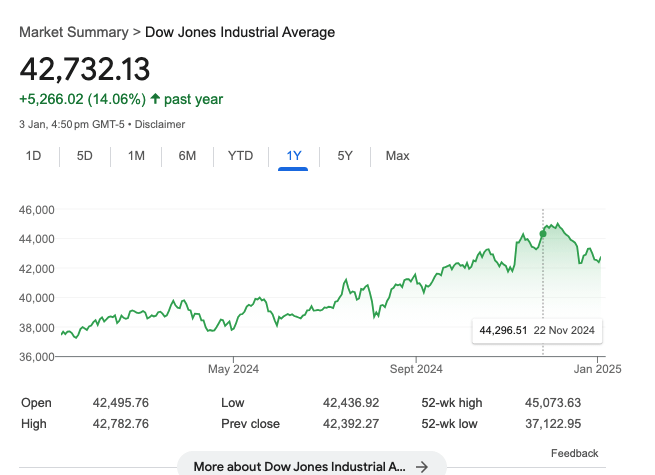The DJIA (the Dow Jones Industrial Average) has been the 'go to' indicator of how markets operate since the 1800's for investors. But until we read an article from Alphinity recently, we didn't realise how monitoring this index probably doesn't really help us with understanding how our investments are performing.
It is generally understood that indexes are 'market weighted'. What this means is that if the total value of an index (eg the S&P500) is US$45.84 trillion dollars, then the largest and most valuable companies wlil carry the greatest weight in the index. So if Microsoft is US$3.19 trillion it will make up 6.74% of the value of the index. If Microsoft goes up in price (and other companies don't) then the index will directly reflect that 6.74% of its value increased.
On the other hand, we discovered that the DJIA is instead 'share price weighted'. What that means is that a company with a $100 share price has twice the weighting as one with a $50 share price. An example of this is 'when Apple undertook a 2:1 stock split in January 20024, this had the effect of halving it's share price'. What that meant is that the value of Apple in the DJIA was also halved (which seems pretty nonsensical, as it was still worth the same, it just had more shares on issue - for every 2 shares an investor had they were issued one more share).
As a result, the Dow Jones is a poor indicator of market returns and is rarely used by serious investors. As Alphinity said:
The Dow you would have bought in the early 1980's is very different to the Dow of today, so you would have had a fair bit of active trading and management to do along the way to hold onto the representative companies in the Dow index. Fewer than half its current companies were in the Dow 40 years ago, and many of today's Dow companies didn't even exist back then. Buying the Dow of then would have landed you with now-defunct companies like Union Carbide (remember Bhopal), Kodak (remember, they didn't think digital camera's would take off), and the old General Motors (before it's bankruptcy in 2009). You would also have owned Tobacco stocks.
The Dow includes 30 of the 'best' US companies - as determined by some faceless committee in New York.
So, although the Dow it has a long track record back to the 1800's it really isn't a reliable marker.
Instead, we should be concentrating on the S&P500 index, which includes 80% of the listed companies in the US by capitallisation (by value). This is what Moneyworks advisers look at first thing when we wake up to get a feel for what the investment community is thinking globally and is a far more reliable 'market weighted' index.


